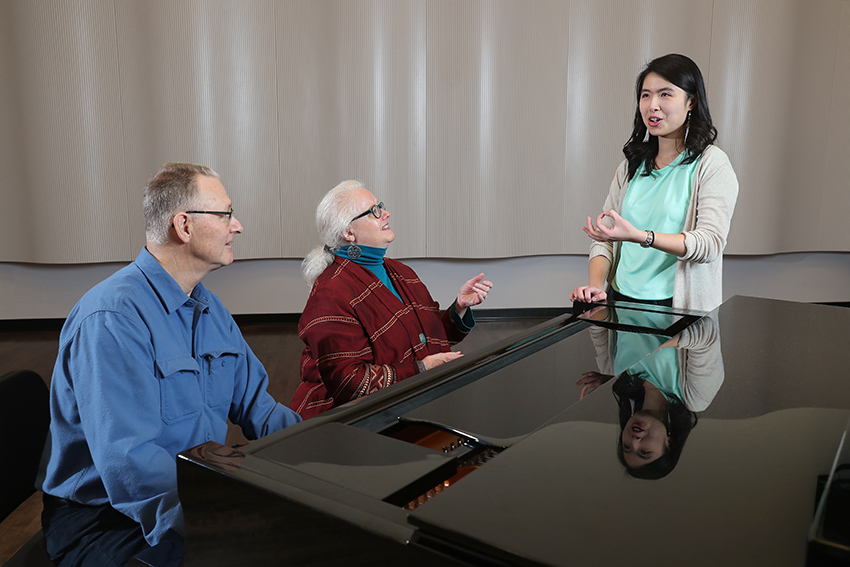Interdisciplinary specialization equips voice students with expanded skills

Proper use of the voice is both an art and a science, and a new master’s specialization program at Bowling Green State University’s College of Musical Arts strengthens both aspects. The interdisciplinary Master of Music in Performance: Specialization in Voice Science and Pedagogy combines coursework in music singing teaching and communication sciences and disorders. It is designed to prepare students to be not only better vocal performers and voice teachers but also to expand their career options.
“There’s been an explosion of interest among music students who want to gain more science-based information about how the voice works,” said Dr. Jane Schoonmaker Rodgers, an associate professor of voice and opera. Rodgers has teamed with Dr. Ronald Scherer, Distinguished Research Professor of communication sciences and disorders in the College of Health and Human Services, to create the new master’s specialization.
“The collaboration seemed like a perfect fit,” said Scherer, who has long provided support for BGSU vocal arts students. “Over the last 10 years there has been a global development of programs that combine serious performance and teaching skills with understanding of speech pathology.
“Students will learn to discern what the voice is doing when it’s right and, when it’s not right, how to alter the production to make it right. ‘Knowledge is power’ in this field, and having it will make interventions more effective and efficient.”
In addition to their vocal performance classes, students in the specialization program will take three courses in the Department of Communication Sciences and Disorders: a speech science class with a lab, a voice disorders class, and a research class with Scherer in which they will undertake a small project to learn how research is conducted.
“Having this specialization will help make graduates even more employable,” Rodgers said. In addition to her teaching, she oversees the graduate student teaching practicums.
Graduate student Crystal Lau, a soprano, is pursuing a second master’s degree, in speech-language-pathology. She graduated in May from the master’s of music in performance, specialization in voice science and pedagogy, program. Lau has firsthand knowledge of how a physical problem can affect the voice, having discovered that the reason she was not making as much progress as she expected with her vocal techniques is that she has laryngopharyngeal reflux, which can damage the vocal folds and surrounding laryngeal structures.
“I struggled for three years not knowing I had that situation and became frustrated and depressed,” she said. “I went to a speech therapist but he didn’t have experience with vocalists and wasn’t very helpful. After I came to BGSU, I went to the Speech and Hearing Clinic, where I was so lucky to have a graduate clinician who has an extensive musical background. The therapy was very beneficial and he was so supportive.”
Lau had heard of the specialization in classes with Rodgers, then met Scherer through the clinic, and it all “clicked.”
“I found myself wanting to learn and know more about anatomy and maybe be able to bring that scientific knowledge into music. That’s where I met Dr. Scherer and completed a small research project with him. I had never thought of myself as a research person, but thanks to Dr. Scherer, he opened up this can of worms,” she said humorously.
“Students in the specialization are required to have a full year of private voice teaching experience, where the students offer weekly voice lessons to non-voice students, outside of their graduate coursework. I think the specialization equipped me with more knowledge than I expected. In my vocal pedagogy practicum, I felt I was able to better help the undergraduates I was teaching with the knowledge I had gained from my voice science studies.”
In addition to her singing, Lau is considering becoming a speech-language-pathologist in a clinic that offers specific assistance to vocal performers.
“This is motivating me to help others, which is where I get the most joy,” she said.
It’s not only singers who are at high risk of vocal disorders, Scherer said. Teachers, especially those in the elementary grades who must speak all day, lawyers, clergy and sports professionals are all among those whose voices are key to their work but who often suffer problems from improper vocal use or overuse.
“Understanding how the body works to produce sound can help to prevent injury,” Scherer said.
In fact, advances in speech science and laryngology have nearly put a stop to career-ending consequences of vocal injuries, he said. “Medical, pharmacological and surgical interventions are now so good that almost never happens,” he said. “For singing teachers, knowing when a disorder might be present in their students can be the first step. Combining pedagogy and speech science is what this program is all about.”
Updated: 01/09/2019 03:47PM
